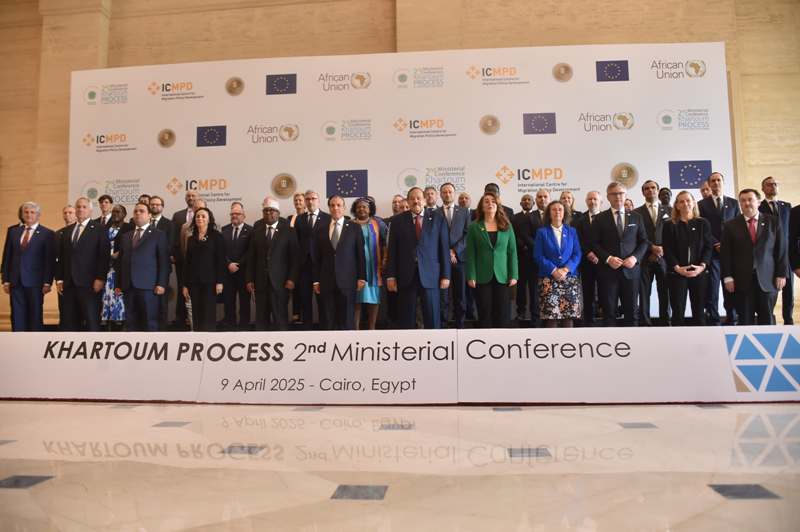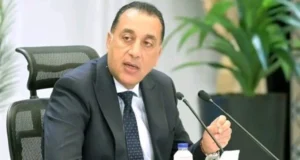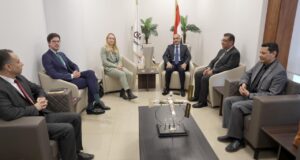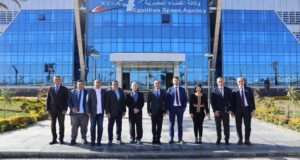Cairo Ministerial Declaration

alhadath – cairo
We, the Ministers of Foreign Affairs, Interior, Labour, Justice, Migration, Integration, Diaspora and other Ministers in charge of migration issues from the Khartoum Process participating States: Austria, Belgium, Bulgaria, Croatia, Cyprus, Czech Republic, Denmark, Djibouti, Egypt, Eritrea, Estonia, Ethiopia, Finland, France, Germany, Greece, Ireland, Italy, Kenya, Latvia, Libya, Lithuania, Luxembourg, Malta, The Netherlands, Norway, Poland, Portugal, Romania, Slovakia, Slovenia, Somalia, South Sudan, Spain, Sudan, Sweden, Switzerland, Tunisia and Uganda; and in the presence of the European Commissioner for Internal Affairs and Migration and High Representatives of the European Commission, the European External Action Service, the African Union Commissioner for Health, Humanitarian Affairs and Social Development and High Representatives of the African Union Commission as well as the Intergovernmental Authority on Development, the International Centre for Migration Policy Development, the International Organization for Migration, the United Nations High Commission for Refugees, and the United Nations Office for Drugs and Crime;
2. Gathered in Cairo on 9th April 2025 at the 2nd Ministerial Conference of the Khartoum Process, upon the invitation of Egypt to assess the progress achieved by the Khartoum Process over the last ten years and discuss the future of this important political consultation and coordination platform in the area of migration;
3. Expressing gratitude to the Chair, Egypt, for the timely initiative, leadership and support to host this Ministerial Conference;
Recognising the key developments in the Khartoum Process region, since the 1 Ministerial Conference in 2014 resulting in the Rome Declaration and since the Senior Officials’ meeting of the Joint Valletta Action Plan in 2018, which have a tangible and direct impact on migratory movements in our region;
5. Acknowledging and expressing appreciation to the International Centre for Migration Policy Development (ICMPD) for its contributions to the Process since its inception;
6. Acknowledging that migration, forced displacement and international protection issues must be addressed in accordance with relevant international law, as stipulated inter alia in the UN conventions. including the 1951 Refugee Convention; and relevant African, European, regional, and national regulations and instruments;
7. Recognising existing policy frameworks and instruments which guide the governance of migration at national, regional, and international levels, including the 2030 Agenda for Sustainable Development adopted in September 2015 and the African Union Agenda 2063 adopted in January 2015;
8. Recalling the main commitments agreed to by European and African leaders at the 6th EU-AU Summit on 17th February 2022, notably on an enhanced and reciprocal partnership for migration and mobility and the respective regional migration policy frameworks; including the Samoa Agreement signed on 15th November 2023 and the EU Pact on Migration and Asylum adopted by the European Parliament and the Council of the EU in May 2024 and their relevance to migration cooperation platforms, such as the Khartoum Process;
9 Taking into account the adoption in December 2018 of the Global Compact for Safe, Orderly and Regular Migration and the Global Compact on Refugees by most Partner States and institutions, reflecting the resolve of participating States to strengthen migration governance and international
Without prejudice to the position of each participating state of the Khartoum Process towards the Global Compact for Safe, Orderly and Regular Migration and the Global Compact on Refugees.
50
protection systems, while taking full account of national competences and the legal framework at the African and the EU level;
10. Considering the impact of climate change, pandemics, and global health emergencies on human mobility and in particular on migrants, refugees, and forcibly displaced persons in vulnerable situations;
11. Concerned about the consequences of protracted crises, conflicts and wars on forced displacement and irregular migratory movements;
Have agreed on the following:
12. Express our satisfaction with the important achievements of the Khartoum Process, as a forum for political dialogue, cooperation, knowledge sharing and support in the area of migration, which highlighted the importance of the regional dimension in tackling the challenges posed by mixed migratory movements of migrants, refugees, asylum seekers, other forcibly displaced persons and victims of human trafficking across countries of origin, transit and destination between the Horn of Africa and Europe as well as those associated with the return and reintegration of people in irregular stay;
13. Acknowledge the potential mutual benefits of safe, orderly, and regular migration and legal mobility pathways for both our continents, while taking full account of national competences and capacities;
14. Re-iterate our determination to pursue effective, comprehensive, responsible and coordinated approaches through the implementation of planned and well-governed migration to ensure safe, orderly, and regular migration while continuing to work to reduce and prevent irregular migration and fight against migrant smuggling and trafficking in human beings, in full respect of international obligations as well as national competences;
15. Reaffirm our commitments made within the Khartoum Process to the effective implementation of the Joint Valletta Action Plan (JVAP), as well as their adherence to the principles of solidarity, cooperation and shared burden and responsibility in the joint efforts to address migration and forced displacement, in full respect of human rights;
16. Encourage synergies and complementarity in our activities, and holding joint initiatives with the Rabat Process, to exchange best practices on issues of common and mutual interest;
17. Emphasise the importance of addressing the multiple root causes of irregular migration and forced displacement in a sustainable manner, inter-alia related to wars, conflicts, economic instability, structural drivers for migration, food insecurity, natural disasters and environmental degradation and climate change; and the importance of reducing their impact in the most affected regions, considering the needs of people in vulnerable situations and employ gender and age sensitive approaches;
18. Stress, in this regard, the need for continued support to strengthen the capacities of countries of origin, transit and destination, while ensuring the alignment of our activities with national, regional, and continental development strategies, including increased attention to women, youth and diasporas as levers of change;
19. Recognise that regular migrants and diaspora contribute to the sustainable development of countries of origin, transit, and destination, in a triple win partnership approach and the importance of promoting and supporting a balanced accurate and evidence-based narratives on migration.
20. Recognise the importance of enhancing existing pathways for regular migration, particularly through bilateral and regional mobility partnerships and circular migration programmes including language and vocational training programmes. These partnerships shall use mutually beneficial talent mobility schemes, while preventing brain drain and respecting national competences and priorities;
21. Acknowledge, in line with international law, the need to ensure adequate protection of the human rights of all migrants, as well as to ensure appropriate treatment of people in vulnerable situations, and to provide due access to international protection for refugees and other forcibly displaced persons;
22. Welcome the numerous efforts undertaken and commitments made by the Khartoum Process Partner States to reduce and prevent irregular migration and fight against smuggling of migrants and trafficking in human beings, aware that this requires a coordinated whole-of-route approach; and emphasise the need for enhanced international cooperation and support to dismantle criminal networks and protect victims, through various initiatives such as the Global Alliance to Counter Migrant Smuggling;
23. Highlight the importance of enhanced cooperation on effective, safe, timely, and dignified return, readmission, and sustainable reintegration, as an essential element of migration policies, in line with obligations under international law and bilateral agreements, the principle of non-refoulement and in full respect of human rights;
24. Reiterate our individual and collective commitment to the Khartoum Process, its principles and objectives, and the importance of giving more visibility to the underlying spirit of partnership and trust-building, in light of its contributions to regional and bilateral cooperation;
25. Recall the commitments made at the 1 Ministerial Conference and the relevance of the 2014 Rome Declaration and the importance of keeping this Process up to date and relevant to the evolution of the challenges and trends in migration;
26. Reaffirm our desire to act in a balanced and integrated manner across all five domains of the Joint Valletta Action Plan (JVAP), to achieve practical results, while taking full account of national competences;
27. Adopt the attached Cairo Action Plan as the strategic framework guiding the Khartoum Process and commit to translating this Action Plan into actionable activities, ensuring alignment with evolving migration trends and regional dynamics organised under the leadership of successive Chairmanships;
28. Decide to hold regular meetings at Ministerial level to consider periodic reports adopted by the Senior Officials Focal Points to periodically monitor and evaluate the implementation of the Cairo Action Plan, in order to ensure progress towards its objectives.
 +00000000
+00000000











